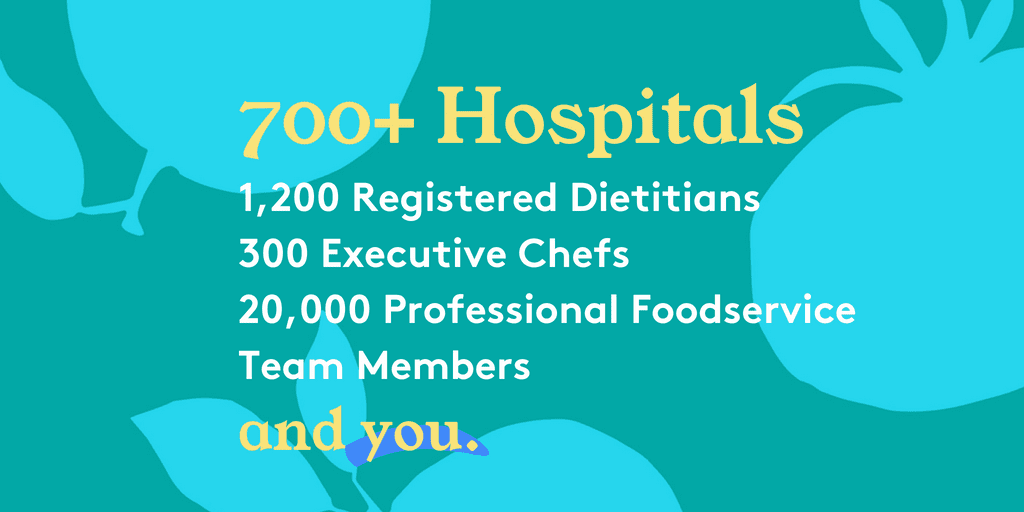By Lisa Roberson, RDN, LD National Director of Wellness and Sustainability
Sustainable Food Makes Our Lives Safer
Food Transparency
Today, people demand transparency about the food they eat. Transparency, however, goes beyond accurately reporting a food’s nutritional value. Consumers are growing more aware of food production practices and want food without hidden pesticides, harmful chemicals, and other additives. And that’s where we play a significant role in sourcing food that is safe and sustainable for meals served in hospitals throughout the U.S.
What we’re seeing now is conversations about sustainability have evolved to include the food supply chain and human health. The focus of nutrition is no longer just about the nutrients that food provides; it’s also about how the food is raised, grown and sourced. As a result, most people have much higher expectations of their food and its impact on human performance.

I prefer to work for an employer that cares about safe environmental practices, farmer welfare, and food justice – and surveys show I’m not the only one. Millennials and others in the emerging workforce care deeply about these issues. At Morrison Healthcare, we are committed to sourcing foods that promote health and well-being as well as protecting the environment.
Our sustainability commitments include:
- Locally sourcing at least 10 percent of produce
- Serving only certified humane cage-free eggs
- Sourcing foods with minimal use or free of chemicals and antibiotics, such as No Antibiotic Ever (NAE) chicken and pork
- Sourcing 100% sustainable seafood, including wild caught or environmentally certified farm-raised fish
- Supporting Fair Food Standards and farmworker’s welfare
- Acting to reduce the eco-print of our foodservice operations
More on sustainability and our results.
How Morrison’s Sustainability Commitment is Making Hospitals and the Environment Safer
Sustainable Meats and Seafood
We have a program in place with New Jersey’s Hackensack Meridian Health System to serve meat, poultry and seafood raised without the use of antibiotics. This is a safety issue for patients because antibiotic overuse in animals contributes to antibiotic-resistant infections in humans.
Antibiotic resistance occurs when germs like bacteria and fungi develop the ability to defeat the drugs designed to kill them. That means the germs are not killed and instead, continue to grow. According to the CDC, “Infections caused by antibiotic-resistant germs are difficult, and sometimes impossible, to treat. In most cases, antibiotic-resistant infections require extended hospital stays, additional follow-up doctor visits, and costly and toxic alternatives.”

By serving meat raised without routine use of antibiotics, we are keeping antibiotics working in humans.
We educate hospital patients and visitors on food safety with signage, so each guest in our cafes are aware when we offer chicken raised with “No Antibiotics Ever” and seafood meeting Aquaculture Stewardship Council (ASC) and Marine Stewardship Council (MSC) standards which assure our salmon’s safety.
My favorite way to communicate these initiatives is through our Teaching Kitchen, where local chefs and dietitians share great practical culinary and nutritional information while leading participants in a hands-on cooking experience.
Sourcing Food Locally
At Hospital Sisters Health System in Springfield, Ill., which operates 15 hospitals in Illinois and Wisconsin, Morrison participates in the hospital’s “Reverence for the Earth” program. Our role is to work with the hospital to purchase local food that reduces the carbon footprint and supports the local economy.
To execute our program, System Executive Chef Chad Crabtree works with five different produce vendors to source as much local produce as possible. He has built solid working relationships with the hospital’s produce representatives to find fresh food that is in season from local farms. We also use this opportunity to buy Imperfectly Delicious Produce – fruits and vegetables that are healthy, but may be slightly bruised or have other minor imperfections. Doing so helps prevent food waste.

We take pride in letting our guests and patients know that our produce is fresh and from local sources, so we publicize our local farms through photographs and descriptions in our cafes. After all, terms like farm-to-table, locally sourced, and sustainably raised are not words most would expect to see in a hospital cafe.
At the University of Virginia Health System, Morrison buys produce and other food from several local sources. The Local Food Hub provides in-season produce, as well as stone ground wheat use for whole wheat pizza dough. Regional Executive Chef James Watton also buys red wine vinegar from a local company and is working closely with a hydroponic lettuce grower to create a branded mix specifically for UVA.
Chef Watton buys a wide variety of locally-sourced vegetables from Produce Source Partners, which grows produce in Virginia and neighboring states. To inform patients about the local food they are eating, he and the hospital system to develop an information card to place on patient trays so they too can learn about how the food they’re eating impacts the environment around them.
Recovering West Coast Groundfish
For many years, too much fishing in the Pacific Ocean caused a shortage of rockfish, sole, cod and other local species of groundfish. But in recent years, the Pacific groundfish fishery management plan had reduced fishing capacity and rebuilt these species. Through the efforts of government regulators and others, quotas were imposed, and many species have recovered and are now sustainable.
Morrison is playing a significant role in helping get these local fish back on the market. We are part of a pilot program to re-introduce rockfish and other species of groundfish onto menus at about a dozen hospitals in California, the last crucial step in the amazing recovery of these fish. Purchasing and serving these wild fish back on people’s plates will be the final step in their recovery – and another success story for sustainable food.
Our effort to revive the groundfish is one way we are continuing to drive change in healthcare organizations nationwide. We are working closely on other initiatives with Practice Greenhealth, a nonprofit organization committed to sustainable health care.
With interest in procuring sustainable food in healthcare is rapidly rising, we are working together with others and bringing our commitment and purchasing power to bear on the market. The result will deliver food that is safer and healthier into the lives of our guests and patients. We believe in the Power of Food, and our sustainable efforts reflect that commitment.
Sources
https://www.cdc.gov/drugresistance/about.html
National Seafood Month is Here

This October, Morrison and the Compass Group family celebrate National Seafood Month by serving a variety of globally-inspired seafood sandwiches as well as traditional favorites. National Seafood Month celebrates our company-wide commitment to purchase sustainable seafood. Through this commitment, we can further the future of our seafood supply, the health of our oceans and the well-being of everyone who enjoys our food.
Join the Morrison Family
Morrison is a Compass One Healthcare operating division within Compass Group and has more than 1,200 registered dietitians, 300 executive chefs, and 20,000 professional food service team members. Apply for team member or management positions in one of the best companies to work for today.





